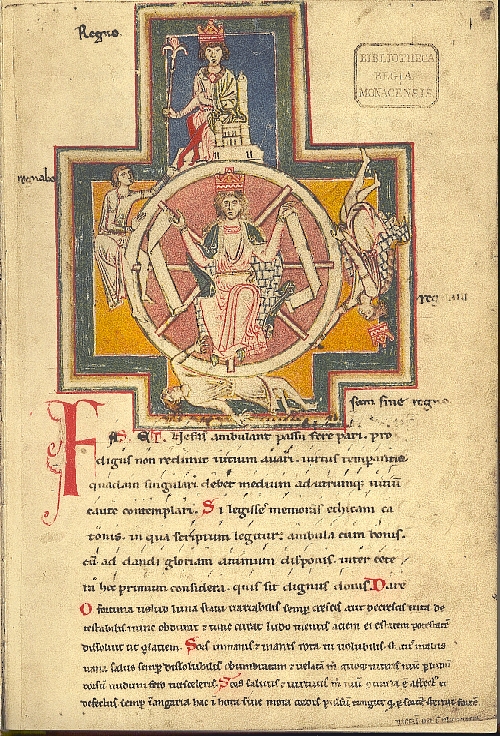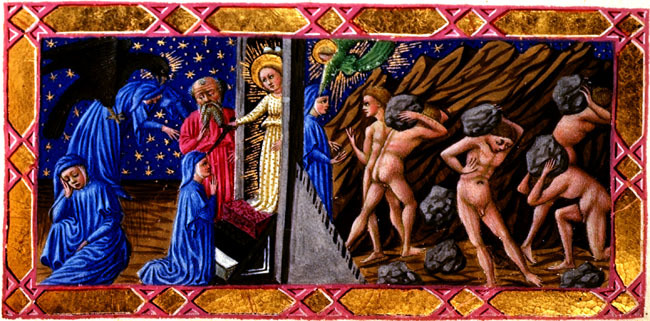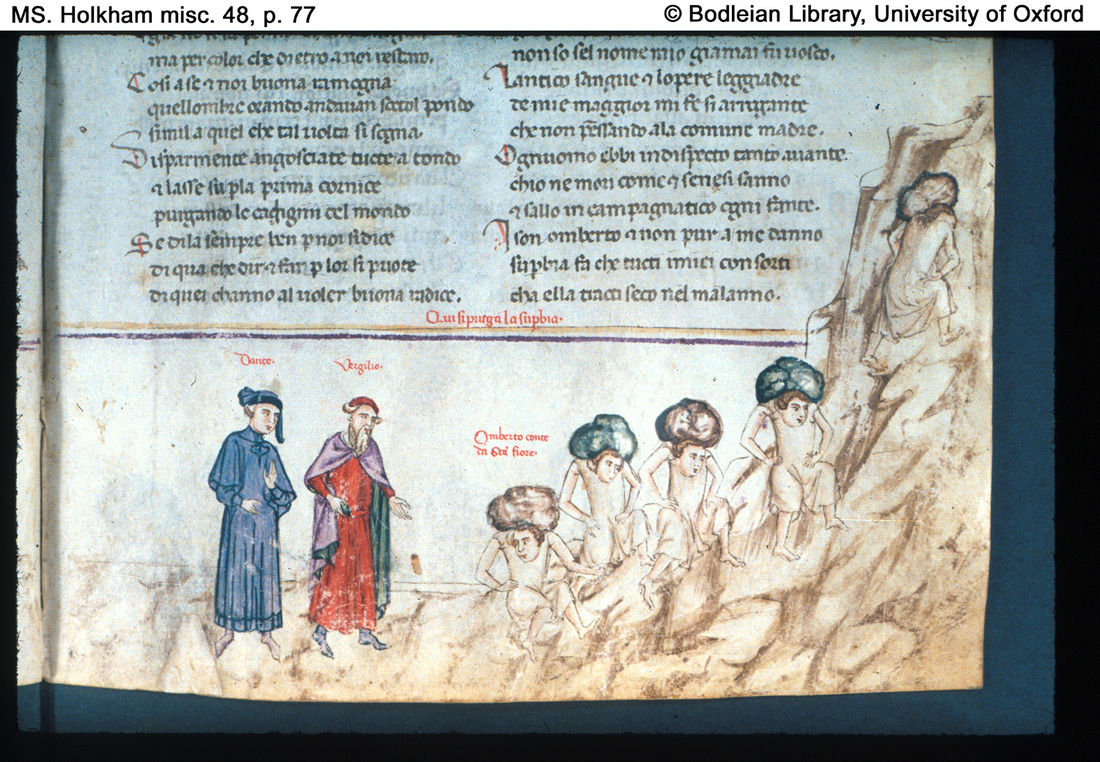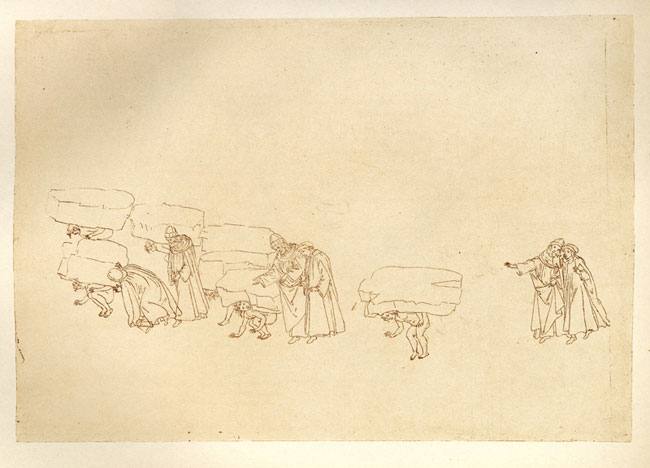Dante gives a lovely example of using the “Our Father” as a paradigm for prayer and meditation. While some commentaries speak of him ‘rewriting’ the prayer, all Dante the Poet is really doing is the common practice of unpacking each section of the Paternoster and using those reflections to delve more deeply into one’s own spiritual reality. Here is a brief excursus on a few phrases of what he does:
1 'Our Father, who are in Heaven,
"O Padre nostro, che ne' cieli stai,
2 circumscribed only by the greater love
non circunscritto, ma per più amore
3 you have for your first works on high,
ch'ai primi effetti di là sù tu hai,
We are reminded in vv. 1-3 that humanity is not the sole object of God’s attention and love. That, of course, would lead to Pride! God loves all of creation, including the very first works on high as well as these broken, fallible creatures of clay that we are.
4 'praised be your name and power
laudato sia 'l tuo nome e 'l tuo valore
5 by every creature, as is fitting
da ogne creatura, com' è degno
6 to render thanks for your sweet breath.
di render grazie al tuo dolce vapore.
Every creature in all of reality should realize that one’s very breath of life is a gift from God. There is no entitlement and we should not feel special simply because we have breath. However, nor should we feel abused and unfairly treated when that “sweet breath” is taken away. All is gift, says Dante the Poet, and all should result in our praising God, regardless of our reality.
7 'May the peace of your kingdom come to us,
Vegna ver' noi la pace del tuo regno,
8 for we cannot attain it of ourselves
ché noi ad essa non potem da noi,
9 if it come not, for all our striving.
s'ella non vien, con tutto nostro ingegno.
For instance, the gift of the Kingdom Peace cannot be attained by us, no matter how hard we try to find and acquire it. Fasting and prayer and almsgiving will not result in peace, “for we cannot attain it of ourselves… for all our striving.” It is only given by the Holy Spirit as gift; pure, underserving gift.
I encourage you to not rush through this portion of the Canto. Take time with each section. Use it as a personal devotion, as a means of emptying oneself of the assumed entitlement and then realize how frail and fragile we truly are without God’s Gifts. Note how the angels surrender their wills of their own accord and how we should be like them when it comes to “Thy will be done…” and not ours. (Truth to tell, we all of us want OUR WILLS to be done, all the time….)
Notice also how we are pulled out of our own self-absorption in order to pray for others, rather than just for ourselves. Purgatorio is a place where the Cloud of Witnesses is a lived reality, and we are there not JUST to cleanse ourselves, but to be bound to one another in the shared air of repentance and love.
22 'This last petition, our dear Lord, is made
Quest' ultima preghiera, segnor caro,
23 now not for ourselves--for us there is no need--
già non si fa per noi, ché non bisogna,
24 but for the ones whom we have left behind.'
ma per color che dietro a noi restaro."
 Fortuna and her "Wheel of Fortune"
Fortuna and her "Wheel of Fortune" As we noted, Canto 11 continues the conversation concerning Pride as the first of the seven sins etched on Dante the Pilgrim’s forehead. There are, in fact, three canti that unpack Pride. This is a sin close to Dante the Poet’s heart, for he mentions several times how this will be brought home to him. Indeed, here and in Canto 12 we find Dante the Pilgrim almost emulating the suffering pilgrims, bowing down and taking their stance. This is not only to be better able to hear them, but there is a clear parallelism going on and Dante the Poet knows he is far too proud far too often. It is, perhaps, for good reason, but there will always be another who comes along and takes away one’s place in the public’s interest. In today’s parlance, Dante admits that there will indeed soon be others who will be ‘trending’ in the public’s imagination, pushing him to the back of the line or off the stage completely. Within the Medieval cultural imagination, this reality was represented as Fortuna: Lady Fortune. She ran the wheel of fortune [no it’s not a TV game show] which will lift you up at one moment, then dump you in the mud at the next moment: no one is exempt.
There are three examples of this prideful leap-frogging shown to us in this canto. While all three revolve around Pride, they are broken down into 1)Pride in Family, 2)Pride in Art, 3)Pride in Power with corresponding examples in each. Omberto shows how Pride can be a family trait which will ultimately destroy every family member. Oderessi is a living example of the fragility of fame in one’s art, which can be overshadowed by the next fad or advance in technique. This is again, as shown in Fortuna’s Wheel, only to be expected: pride in one’s art is short-lived and needless if it is only based on one’s own ego-needs. It must be done to give glory to God, not to bring glory to one’s own house or oneself.
Dante the Pilgrim is reminded that he too will be taught a lesson about Pride of one’s own work and how that cannot save oneself. This lesson will not be taught by Virgil, nor by those with whom he speaks in Purgatory, but, rather, by his own townsmen. They will send him into exile and Dante the Pilgrim [as well, of course, as Dante the Poet] will be forced to humbly rely on God and others for one’s day-to-day reality.
[Hollander translation:]
139 'I say no more, and know my speech obscure.
Più non dirò, e scuro so che parlo;
140 It won't be long before they act, your townsmen,
ma poco tempo andrà, che ' tuoi vicini
141 in such a way that you'll know how to gloss it.
faranno sì che tu potrai chiosarlo.
142 It was that deed which brought him past those confines.'
Quest' opera li tolse quei confini."
[Ciardi translation:]
139 'I say no more, and though you may feel
Più non dirò, e scuro so che parlo;
140 I speak in riddles, it will not be long
ma poco tempo andrà, che ' tuoi vicini
141 before your neighbors’ actions will reveal
faranno sì che tu potrai chiosarlo.
142 all you need know to fathom what I say.
Quest' opera li tolse quei confini."
The next Canto concludes this lesson on Pride, something which Dante the Poet shows is desperately needed by Dante the Pilgrim; it is his [and our] besetting sin.



 RSS Feed
RSS Feed
